-
 bitcoin
bitcoin $87959.907984 USD
1.34% -
 ethereum
ethereum $2920.497338 USD
3.04% -
 tether
tether $0.999775 USD
0.00% -
 xrp
xrp $2.237324 USD
8.12% -
 bnb
bnb $860.243768 USD
0.90% -
 solana
solana $138.089498 USD
5.43% -
 usd-coin
usd-coin $0.999807 USD
0.01% -
 tron
tron $0.272801 USD
-1.53% -
 dogecoin
dogecoin $0.150904 USD
2.96% -
 cardano
cardano $0.421635 USD
1.97% -
 hyperliquid
hyperliquid $32.152445 USD
2.23% -
 bitcoin-cash
bitcoin-cash $533.301069 USD
-1.94% -
 chainlink
chainlink $12.953417 USD
2.68% -
 unus-sed-leo
unus-sed-leo $9.535951 USD
0.73% -
 zcash
zcash $521.483386 USD
-2.87%
How to mine Bitcoin personally
By following a structured approach that involves understanding the basics, setting up hardware and software, joining a mining pool, and addressing security concerns, individuals can embark on their Bitcoin mining journey and contribute to the decentralized validation and maintenance of the Bitcoin network.
Jan 09, 2025 at 09:50 pm
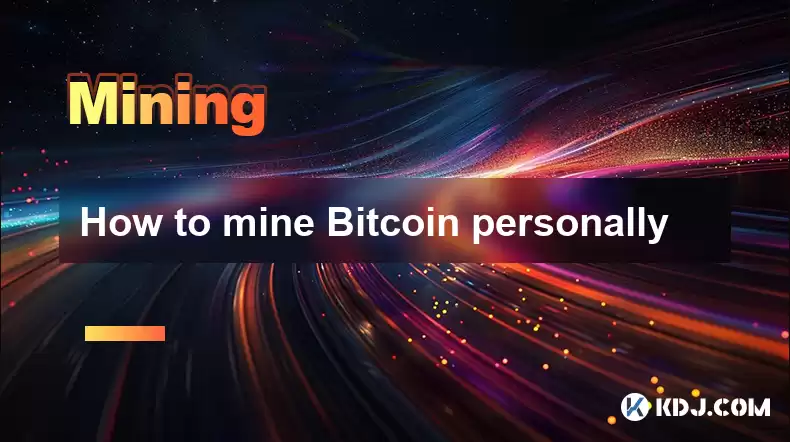
- Understanding Bitcoin Mining
- Setting Up Hardware
- Choosing Mining Software
- Joining a Mining Pool
- Setting Up a Mining Rig
- Troubleshooting Common Issues
- Security Considerations for Bitcoin Mining
Bitcoin mining is the process of verifying and adding new transactions to the Bitcoin blockchain, a decentralized and public ledger that records all Bitcoin transactions. Miners use specialized computers to solve complex mathematical puzzles to validate blocks of transactions. The first miner to solve a block receives a reward in the form of newly minted Bitcoin and transaction fees associated with the block.
2. Setting Up HardwareFor personal Bitcoin mining, you will need specialized hardware known as Application-Specific Integrated Circuits (ASICs). ASICs are designed specifically for the purpose of mining Bitcoin and offer much greater efficiency than general-purpose CPUs or GPUs. Several reputable manufacturers offer ASIC miners, such as Bitmain, Canaan Creative, and MicroBT.
3. Choosing Mining SoftwareThe mining software you choose will interface with your hardware and handle the technical aspects of mining. Popular mining software options include CGminer, Bitcoin Miner, and Awesome Miner. These software programs allow you to configure your mining settings, monitor your progress, and receive rewards when blocks are successfully mined.
4. Joining a Mining PoolSolo mining, where you attempt to mine blocks independently, requires significant investment and has a low probability of success. Joining a mining pool increases your chances of finding blocks by combining resources with other miners. Mining pools distribute rewards to members based on their contribution to the pool's overall mining power.
5. Setting Up a Mining RigA mining rig consists of your hardware, software, and necessary accessories. Setting up the rig involves assembling the components, connecting them properly, and configuring your mining software. Ensure your rig has adequate cooling to prevent overheating and maintain optimal performance.
6. Troubleshooting Common Issues- Overheating: Ensure proper ventilation and consider using cooling fans to keep your equipment operating efficiently.
- Software errors: Check your software logs for error messages and troubleshoot accordingly.
- Hardware failures: If specific components fail, replace them with compatible parts from reputable suppliers.
- Network connectivity: Ensure your mining rig is correctly connected to the internet and has a stable connection.
- Malware protection: Install and maintain anti-malware software to protect your rig from viruses and malicious software that could compromise your security and steal your rewards.
- Strong passwords: Use strong and unique passwords for your mining software and pool accounts to prevent unauthorized access.
- Keep software up to date: Regularly update your mining software and operating system to address security vulnerabilities and improve performance.
Can I mine Bitcoin with a home computer?While technically possible, it is not profitable to mine Bitcoin using a home computer due to the high electricity costs and low hashing power.
How much does it cost to mine Bitcoin?The cost of Bitcoin mining varies depending on factors such as hardware, electricity costs, and mining pool fees. However, it typically involves significant upfront investment and ongoing expenses.
Is Bitcoin mining profitable?The profitability of Bitcoin mining fluctuates based on market conditions, the price of Bitcoin, and mining difficulty. It is important to carefully assess the costs and potential rewards before starting.
What is the recommended hardware for Bitcoin mining?The most efficient hardware for Bitcoin mining is Application-Specific Integrated Circuits (ASICs). These specialized devices are designed specifically for mining and offer much greater performance than CPUs or GPUs.
How do I choose a mining pool?Consider factors such as pool size, fees, payout methods, and reliability when selecting a mining pool. Research and compare multiple pools to find one that aligns with your needs.
Disclaimer:info@kdj.com
The information provided is not trading advice. kdj.com does not assume any responsibility for any investments made based on the information provided in this article. Cryptocurrencies are highly volatile and it is highly recommended that you invest with caution after thorough research!
If you believe that the content used on this website infringes your copyright, please contact us immediately (info@kdj.com) and we will delete it promptly.
- Work Dogs Unleashes TGE Launch, Sets Sights on Mid-2026 Listing & Ambitious $25 Token Target
- 2026-01-31 15:50:02
- WD Coin's TGE Launch Ignites Excitement: A Billion Tokens Set to Hit the Market
- 2026-01-31 16:10:02
- Royal Mint Launches Interactive £5 Coin for a Thrilling Code-Breaker Challenge
- 2026-01-31 16:10:02
- Crypto, AI, and Gains: Navigating the Next Wave of Digital Assets
- 2026-01-31 15:50:02
- Coin Nerds Forges Trust in the Digital Asset Trading Platform Landscape Amidst Evolving Market
- 2026-01-31 16:05:01
- Blockchains, Crypto Tokens, Launching: Enterprise Solutions & Real Utility Steal the Spotlight
- 2026-01-31 12:30:02
Related knowledge
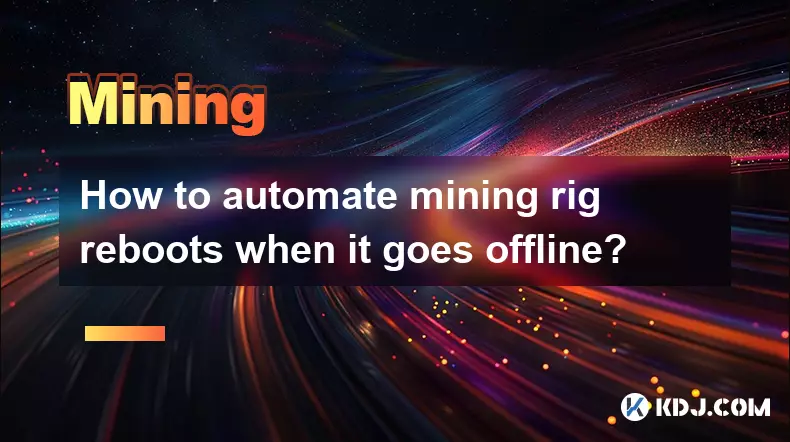
How to automate mining rig reboots when it goes offline?
Jan 23,2026 at 11:00pm
Monitoring System Integration1. Deploy a lightweight agent on the mining rig’s host OS that continuously reports hash rate, GPU temperature, and pool ...
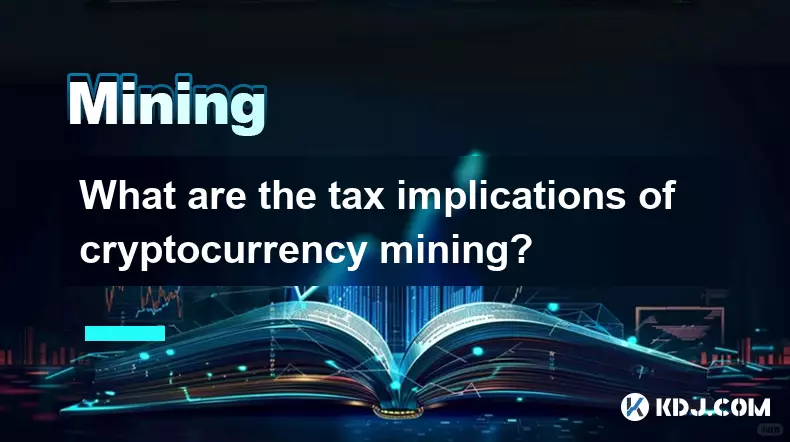
What are the tax implications of cryptocurrency mining?
Jan 23,2026 at 02:40am
Tax Treatment of Mining Rewards1. Cryptocurrency received as a reward for mining is treated as ordinary income by the IRS at the fair market value on ...
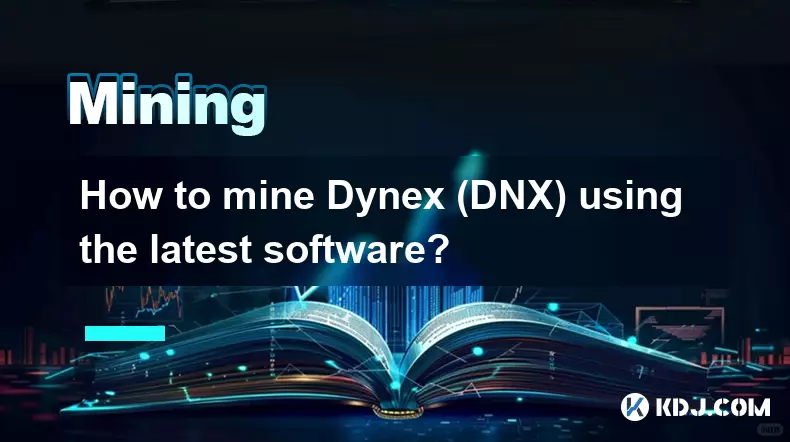
How to mine Dynex (DNX) using the latest software?
Jan 22,2026 at 10:00am
Understanding Dynex Mining Fundamentals1. Dynex (DNX) operates on a proof-of-work consensus mechanism optimized for neuromorphic computing workloads, ...
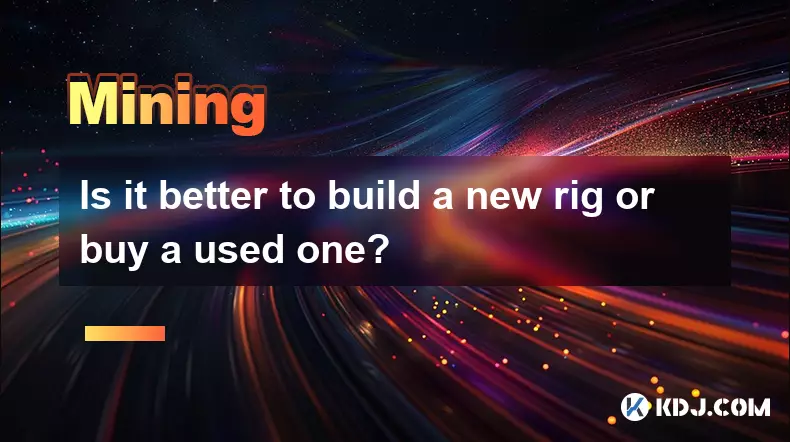
Is it better to build a new rig or buy a used one?
Jan 24,2026 at 10:20pm
Cost Efficiency Analysis1. New mining rigs come with manufacturer warranties, typically covering components for one to three years. This assurance red...
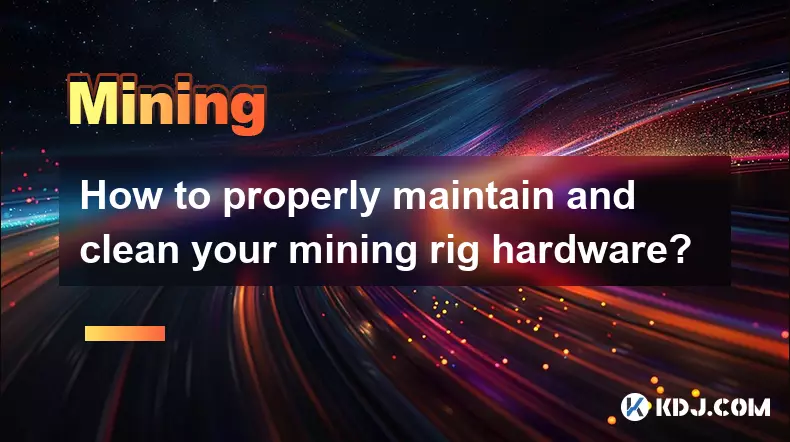
How to properly maintain and clean your mining rig hardware?
Jan 19,2026 at 11:00am
Cooling System Inspection and Optimization1. Dust accumulation inside fans and heatsinks directly reduces thermal dissipation efficiency, leading to h...
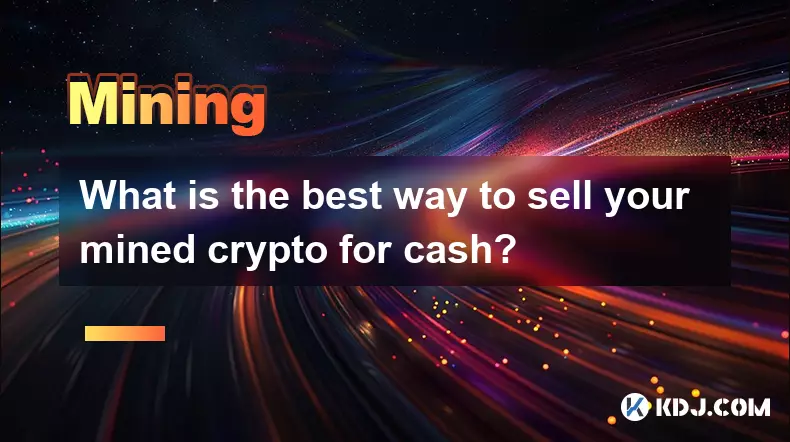
What is the best way to sell your mined crypto for cash?
Jan 20,2026 at 02:59am
Choosing the Right Exchange Platform1. Select an exchange with strong regulatory compliance and a proven track record of secure withdrawals. Platforms...

How to automate mining rig reboots when it goes offline?
Jan 23,2026 at 11:00pm
Monitoring System Integration1. Deploy a lightweight agent on the mining rig’s host OS that continuously reports hash rate, GPU temperature, and pool ...

What are the tax implications of cryptocurrency mining?
Jan 23,2026 at 02:40am
Tax Treatment of Mining Rewards1. Cryptocurrency received as a reward for mining is treated as ordinary income by the IRS at the fair market value on ...

How to mine Dynex (DNX) using the latest software?
Jan 22,2026 at 10:00am
Understanding Dynex Mining Fundamentals1. Dynex (DNX) operates on a proof-of-work consensus mechanism optimized for neuromorphic computing workloads, ...

Is it better to build a new rig or buy a used one?
Jan 24,2026 at 10:20pm
Cost Efficiency Analysis1. New mining rigs come with manufacturer warranties, typically covering components for one to three years. This assurance red...

How to properly maintain and clean your mining rig hardware?
Jan 19,2026 at 11:00am
Cooling System Inspection and Optimization1. Dust accumulation inside fans and heatsinks directly reduces thermal dissipation efficiency, leading to h...

What is the best way to sell your mined crypto for cash?
Jan 20,2026 at 02:59am
Choosing the Right Exchange Platform1. Select an exchange with strong regulatory compliance and a proven track record of secure withdrawals. Platforms...
See all articles





















![Ultra Paracosm by IlIRuLaSIlI [3 coin] | Easy demon | Geometry dash Ultra Paracosm by IlIRuLaSIlI [3 coin] | Easy demon | Geometry dash](/uploads/2026/01/31/cryptocurrencies-news/videos/origin_697d592372464_image_500_375.webp)




















































